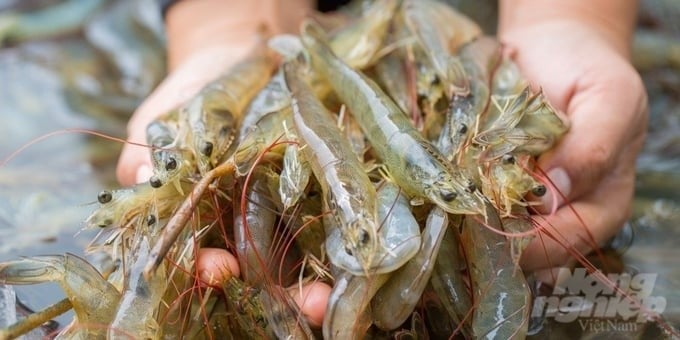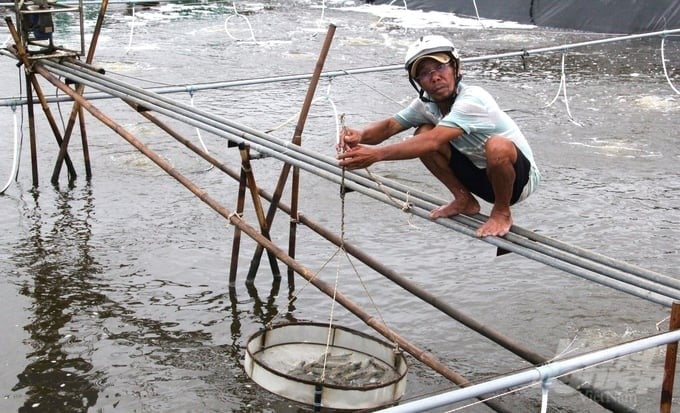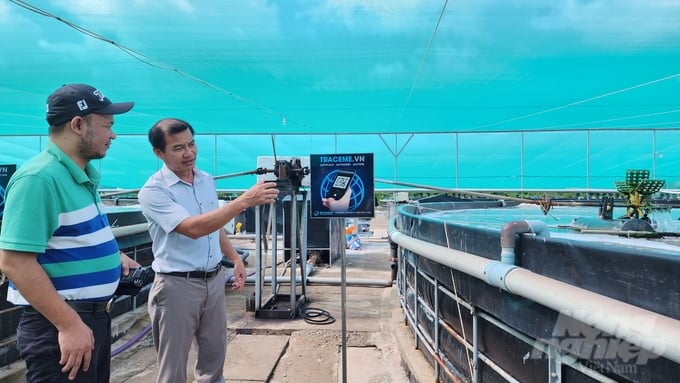June 15, 2025 | 18:29 GMT +7
June 15, 2025 | 18:29 GMT +7
Hotline: 0913.378.918
June 15, 2025 | 18:29 GMT +7
Hotline: 0913.378.918

The loss rate in shrimp farming due to diseases fluctuates every year, affecting many farmers in the Mekong Delta region. Photo: Kim Anh.
According to statistics from the Department of Fisheries (Ministry of Agriculture and Rural Development), Vietnam is the second largest shrimp supplier in the world, with export value accounting for 13–14% of the total world shrimp export value. In particular, the shrimp industry contributes 40–45% of the country's total seafood export value and creates jobs for about 3 million workers.
However, according to the assessment of many businesses, this industry has not yet built a standard production process, and farmers mainly rely on their own experience. This makes farmed shrimp susceptible to diseases, with a rate of about 20% of the farming area. Among them, Enterocytozoon hepatopenaei (EHP) disease is popular in Long An, Bac Lieu, Soc Trang, and Ca Mau provinces.
Mr. Hoang Thanh Vu, Deputy General Director of Sao Ta Food Joint Stock Company, said that the current biggest concern for the shrimp industry comes from damages caused by diseases.
Mr. Vo Van Phuc, General Director of Viet Nam Clean Seafood Corporation, said that the important thing is that farmers have to grasp knowledge about the soil of the farming area, the time of outbreaking diseases, or understand types of disease to take preventive measures.
Mr. Phuc is concerned that letting poor-quality seeds circulate too much like today is a huge "crime" against shrimp farmers, causing damage to the entire economic sector.
Following the problem of diseases in farmed shrimp, Mr. Ho Quoc Luc, Chairman of the Board of Sao Ta Food Joint Stock Company, shared with reporters of the Vietnam Agriculture Newspaper that to minimize risks for the shrimp industry, there are many things to do.
Typically, state agencies must make efforts to minimize disease risks through strengthening seed quality control. For farmer households, it is necessary to follow the criteria of "comfort is better than pride," which means organizing production within the allowable scope, financial capability, and technical knowledge.

Shrimp farming households need to organize production within the allowable scope, financial capability, and techniques to minimize damage during the farming process. Photo: Kim Anh.
As for the processing field, Chairman Ho Quoc Luc also proposed a number of solutions, such as considering the individual strengths of each business, finding appropriate markets, and trying to reduce production costs to increase competitiveness.
In the meantime, businesses must also consider finding new partners and customers to maintain growth. Along with that, create financial resources to share with shrimp farmers. These factors will be important links for the shrimp industry chain to survive and develop sustainably.
Mr. Dang Quoc Tuan, Vice Chairman of the Board of Southern Aquatic Product Corporation, also assessed that the shrimp industry's farming process is currently incomplete in both input factors, technology applications, and farming techniques.
However, on the positive side, Mr. Tuan assessed the non-industrial factor as an attractive point of the industry, creating opportunities to attract "big guys" to join the linkage chain. Proving this assertion, Mr. Tuan said that when the field of pig or chicken farming was standardized, many large domestic and foreign enterprises invested and produced very high output.
Looking at the reality of the shrimp industry, Mr. Tuan considers this a normal story and must accept it to gradually change direction to attract large investors.

Shifting toward the trend of shrimp industry management with specific norms, standards, and methods is inevitable. Photo: Kim Anh.
"Enterprises or large investors participating in the shrimp industry chain will develop strongly in scale and business methods. If the industry wants to be as expected, it must create a game for large investors," Mr. Tuan emphasized.
Therefore, the current inevitable trend is to move to the stage of management with norms and standards. To be more specific, regarding seeds, there must be "measures" to ensure good, disease-free seeds. Measurement methods need to be standardized. Similarly, the farming and processing stages also need to be managed with specific standards and methods.
According to the preliminary assessment of the Research Institute for Aquaculture No. 2 (Ministry of Agriculture and Rural Development), the loss rate in shrimp farming due to diseases fluctuates every year, so the integration of technical solutions for farming pond management to minimize diseases in farmed shrimp and increase production efficiency is very important.
In addition, increasing shrimp stocking density needs to consider the rate and speed of water changes and the water filtration ability of the filtration system to save costs on chemicals, microorganisms, minerals, energy, etc.
Translated by Huyen Vu Thu

(VAN) The UNESCO Global Geopark revalidation of Non nuoc Cao Bang and the transition to a two-tier administrative model are presently undergoing a pivotal moment in Cao Bang, the northernmost province of Vietnam.
/2025/06/13/5330-2-004539_953.jpg)
(VAN) Changing policy mindset and removing investment barriers are urgent requirements to open up new development space for enterprises in the agricultural sector.

(VAN) The areas include the restoration of five million hectares of marine ecosystems.

(VAN) Dr. Le Van Nguyen, Director of the Institute of E-Commerce Management (ECM), emphasizes the potential for green development through the cultivation of fruit trees, particularly in provinces such as Son La.

(VAN) VAAS and numerous Vietnamese enterprises have signed cooperation agreements with Japanese partners to promote agricultural technology and trade connectivity.
/2025/05/29/5625-12-214801_567.jpg)
(VAN) Provincial mergers in the Mekong Delta promise to streamline administration, expand inter-provincial raw material areas, and foster close linkages in agricultural value chains, benefiting both businesses and cooperatives.

(VAN) Merging Mekong Delta provinces contributes to the expansion of agricultural raw material areas, addressing previous constraints caused by provincial boundaries. Additionally, this expansion will reduce costs and strengthen linkages between businesses, cooperatives, and farmers.